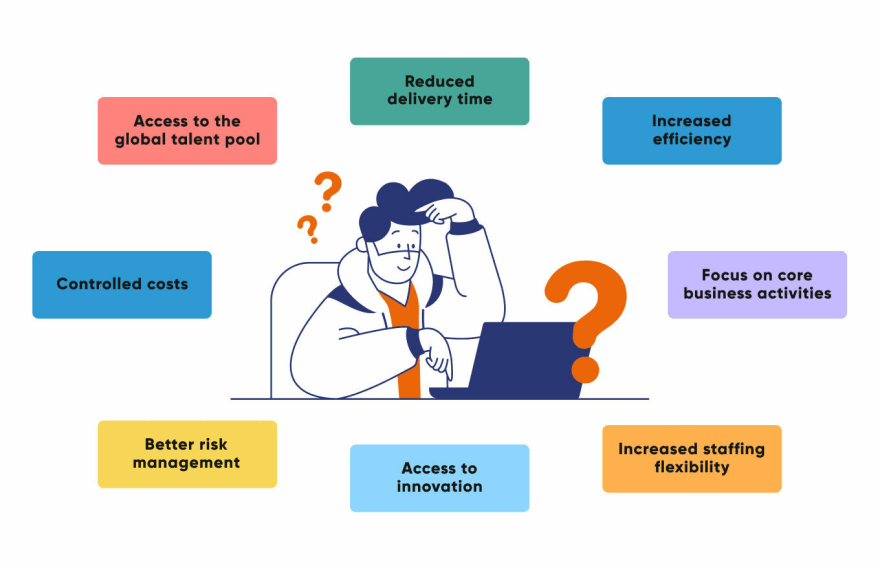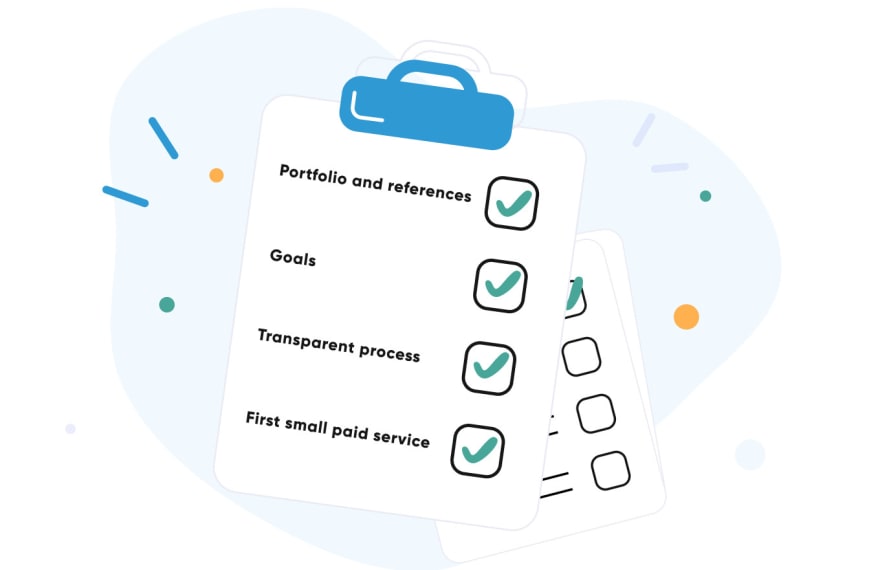The original article was written by SoftFormance https://www.softformance.com/blog/outsourcing-benefits/
Nowadays, businesses offering their products have a choice: to work on their services by themselves or to hire an external agency.
If you have a team that develops software in your office, we call it an in-house team. This is a team of your permanent employees that has a direct line of communication with you and understands your organizational culture.
If you decide to work with a remote team of third-party providers, we call this process outsourcing.
Outsourcing certain IT tasks have become quite a trend nowadays. In fact, in 2022, businesses plan to spend more than 21% of their tech budgets on outsourcing IT functions to third-party providers.
Why is this shift happening, then?
Well, according to the recent statistics, 31% of all workers worldwide will be remote in 2022. In Europe, this number will rise up to 52% of all workforce.
With more and more specialists switching to remote work, the global talent pool is growing. As a result, companies have started to consider outsourcing a great option to reduce costs, focus on core business activities, and find experts with rare skills.
It sounds like a perfect solution for all. However, there are completely different statistics.
According to Dun & Bradstreet’s report, 20-25% of all outsourcing relationships fail within two years, and 50% fail within five.
Not a very optimistic picture, isn’t it?
But it shouldn’t discourage you from trusting third-party providers. If you are aware of the possible issues, you can come prepared and avoid them easily.
Outsourcing isn’t without its risks and horror stories, and you’ve definitely heard some of them from your colleagues or friends. Indeed, there have been many reports of failures due to communication barriers, hidden costs, privacy, and security issues. Such risks make people think twice before delegating work to external teams.
All of the outsourcing risks make business owners’ skin crawl, and they may wonder: why would a sane person do it?
Have you ever thought about it yourself?
If you’re wondering whether to outsource or not, keep on reading. In this material, I’ll talk in detail about the outsourcing benefits for developers and focus on its possible risks and their mitigation.
So, grab a cup of coffee or tea and enjoy!
Outsourcing benefits
These days many businesses outsource 70% to 80% of the content of their finished products. What is more, some companies outsource half of their IT operations.
These statistics indicate one thing: outsourcing has proven to be an incredibly beneficial practice, no matter what your business is focused on.
So, why would a company choose to trust third-party providers with a specific task or a job? Here are some of the most common advantages of outsourcing:
- Controlled costs Perhaps, the number one reason why developers consider outsourcing. It is not necessarily about lower costs but the business’s ability to control the expenses and decide in which area to invest more.
For instance, if your business is growing, and you are in need of new equipment/more office space/new employees, it would be more cost-effective to outsource certain operations. This would save you money and allow you to focus on other tasks.
When hiring new employees, companies need expenses for the hiring search, onboarding training, payroll taxes, healthcare, and other benefits. Outsourcing does not require any of those expenses. Thus, it is the question of priorities.
You need to decide what is your company’s primary goal and whether outsourcing will help you achieve it.
Lower costs do not mean lower quality. It is entirely possible to get the best out of both worlds. The key is to choose wisely among the thousands of experts in the global talent pool.
Keep in mind that the price for IT services varies around the world due to differences in the cost of living, economics, and other factors. Why spend extra money if you can receive the same, or even better, results by delegating the task to external companies?
One of our recent clients came to us with a great product, but what they lacked was updated software. Our team quickly built a new appealing backend for them, and after saving both money and time and receiving great feedback, the company decided to outsource even more tasks to our team. If they had decided to work with their in-house team, the expenses would have been five times higher.
- Access to the global talent pool With your markets being global, your talent becomes global, too.
Outsourcing allows companies to think outside of the internal recruiting box and hire talent from all over the world. Major brands like Microsoft, Amazon, and Google have been outsourcing their workforce, so why wouldn’t you? Especially now, when the market is overflown with talented experts.
In Eastern Europe and Latin America, there is a much higher representation of talented developers who specialize in specific coding languages. This makes these parts of the world attractive for businesses of all sizes due to the high quality of delivered products and lower costs.
Say you live in a small town with only one supermarket. There’s nothing wrong with it, it’s a perfectly fine store, and you have been shopping there for years. This time, you need an ingredient for a new recipe you have found online because you want to impress your friends.
The ingredient is nowhere to be found in your town. You can substitute it, but you’re not sure about the outcome.
But you know for sure that a store in a nearby town has it, and you can easily drive there.
Of course, if you want a perfect meal that follows the recipe, you should leave your town and buy that ingredient.
What’s this all about? Well, the same applies to outsourcing.
It allows you to find experts with rare skills that are crucial for the success of your project. Moreover, global talent allows bringing new ideas to the table, just like that ingredient would make a meal richer and more interesting.
Yes, you can find someone locally, but you can never be sure that you will receive the same result.
Why limit yourself, then, when the world is open?
- Reduced delivery time When you need to build a house, you hire a large team of experts: designers, builders, engineers, plumbers, contractors. More people means faster construction. Imagine how long it would take for three people to build the house?
The same with software development. A large outsourcing team would allow you to finish the project much faster than it would take for the in-house team. It also allows dividing the tasks to make the work more effective.
Outsourcing also allows employing people from different time zones. While your in-house team is sleeping after a long day at work, external experts may be actively developing your software. Who wouldn’t love their product to be developed around the clock?
For example, we released our recent project ToDoo in only six weeks, while the client was working on a new course, which they later sold to 1700 students.
![图片[1]-Outsourcing Benefits and Ways to Mitigate Possible Risks - 拾光赋-拾光赋](https://res.cloudinary.com/practicaldev/image/fetch/s--Qx4JGW9P--/c_limit%2Cf_auto%2Cfl_progressive%2Cq_auto%2Cw_880/https://dev-to-uploads.s3.amazonaws.com/uploads/articles/g1mndp25tp6ubf6koc7f.jpg)
In those six weeks, they spent only 7.5 hours communicating with our dev team. By delegating the task to our team, the client saved time and could shift their focus to the course development. It would take the company twice the time if they worked on both projects in-house.
- Increased efficiency Efficiency is among the most challenging objectives to achieve for many companies, big or small.
Outsourcing is able to help your business optimize the resources at hand to achieve top results and reduce your costs. If you have been looking for a solution to increase efficiency at your firm, outsourcing comes to your rescue.
This practice allows you to delegate specific tasks to experts who specialize in the services you require. As a result, it helps you boost productivity because each employee is focused on what they do best.
When you need to do repairs in your house, you don’t call one person to do all the work. You call a plumber, an electrician, a cleaner, and, maybe, a gardener. This way, each person will do the work they have been trained to do, and it will be more effective than employing one Jack of all trades.
Check out this article about how to choose the right development team.
- Focus on core business activities Another benefit of outsourcing is that it allows you to focus on the area you are good at and delegate the rest of the tasks.
Is your company working in a non-IT sector? Then, a great idea would be to delegate all IT-related duties to a third-party provider.
Nowadays, partnering with external companies is not simply an option; it has become a necessity for many businesses. This way, they have more time to concentrate on their core business activities and strategy development.
By focusing solely on your core business activities, you save time, money, avoid stress, and put all the energy into what matters the most. You don’t want your in-house team to be burnt out because of heavy workload and constant stress, especially when it is so easy to avoid.
If you want your business to grow and have a competitive advantage in the market, focus on the core business activities and let external agencies handle the rest.
- Increased staffing flexibility The early stages of project development require employing a lot of experts, and the hiring process takes a lot of time, commitment, and money. The thing is, you need to find a perfect candidate who will stay with you for a long time, share the same values and goals, and demonstrate excellent performance. This task is not an easy one.
That is when outsourcing comes in handy.
Hiring an external team means that you can reduce or extend your workforce easily at any time, choose among great talent, and ensure that each project is delegated to a professional.
You can outsource not only the early stages of development.
When the time comes for further development, the workload can become unbearable, and there’s no guarantee that your in-house team will be able to survive through it.
Having the tool of outsourcing at your disposal allows you to work smarter, not harder.
- Access to innovation People often say that the best experiences happen to those who leave their comfort zones. Be it embarking on a new journey and leaving everything behind, trying a new business model or product, or facing your fears.
Well, it is the same in business.
For your business to prosper and be competitive, you need a team of experts who are creative, innovative, and think outside of the box. Even though your in-house team knows all the processes in the company and shares the same goals, it can be challenging for them to suggest original ideas and solutions.
That is why you need outsourcing.
By expanding your workforce with talented external developers, you welcome new ideas and solutions for your business that haven’t been proposed yet. Creativity and innovation are key if you want to stay competitive in the global market, and professionals with experience in various technologies can help you achieve it.
- Better risk management Choosing an experienced outsourcing company allows you to mitigate risks.
How?
It may happen that your in-house team lacks competence in some areas. When you delegate these tasks to experienced developers, you reduce the risks of possible failure. External experts are working on their tasks, and your in-house team is focused on what they do best.
Effective risk mitigation is crucial for a business’s viability. Outsourcing also reduces the risks of making the wrong decision when hiring someone long-term. With outsourcing, you can choose among new talents, test their skills and expertise, and choose the best one for your business goals.
As you can see, there are a lot of outsourcing benefits for developers, the key is to be aware of the risks. And there are plenty of them.
In the next section, I want to talk about the real risks of outsourcing and explain how you can avoid them.
Outsourcing risks and how to mitigate them
- Security and trust risk The number one question that arises in minds of business owners is “Can I really trust experts located miles away?”
This worry is valid. You don’t want to be left with anything or, what is worse, have your project stolen?
When you outsource your projects, you expose your business assets to people outside of the company, and that is why you should pay close attention to data protection.
Before trusting an outsourcing company, analyze all the risks and check if you have the necessary security measures in case something doesn’t go according to plan.
According to the Ponemon Institute report, 59% of companies have experienced a data breach caused by one of their vendors or third parties. You don’t want to be among them, right?
What is more, many of those breaches go undetected. The reasons for security issues can vary from business to business: a lack of centralized control, lack of resources, or complex relationships with external teams.
Forewarned is forearmed. We want to make sure that your company does not experience any security issues while outsourcing. That is why I have compiled a list of possible solutions.
Solution:
Safeguard your information.
Choose a provider based on their maturity: the number of employees, years on the market, past projects.
Look at the company’s website. Would they be able to successfully finish your projects if they couldn’t perfect their own?
Always check the company’s ranking on platforms like Clutch.co
Sign a Non-Disclosure Agreement before you start working with the provider.
Always reach the part and current clients of the company and get feedback from them.
If needed, ask to complete a test task (discovery workshop) before your cooperation to check if the company is able to complete what you need.
- Broken releases and wrong features The issue of quality is one of the most common in the world of outsourcing. The main reason businesses outsource is to receive better results than they would with their in-house team, but often the outcome is the opposite.
Another issue is the lack of expertise with outsourced teams. If you have never worked with outsourced teams, you can lack knowledge on how to choose one and how to manage remote operations. As a result, it can affect the quality of the finished product.
What should be done in this case, then?
Solution:
Choose a company that specializes in the projects you need to be completed. Check their last projects.
Choose a provider that has an established model of remote cooperation.
Research the outsource market thoroughly and read the reviews.
If you don’t have experience with remote workers, ask your partner to train your employees on how to cooperate with external experts.
- Loss of control over the processes It’s in human nature to always want to be in control of things. The minute we feel that there’s a lack of control and we cannot influence the outcome, we start panicking. The same can happen with outsourcing.
Working with an in-house team means knowing that you are in control of each and every process of development. Whenever something does not go according to plan, you can easily handle it.
It’s not possible when you outsource your tasks. The minute you hire third-party providers, your sense of control is lost, and you can only hope that it doesn’t lead to a disaster.
What are the real risks here?
Scope creep is a common issue if your project is not properly controlled or defined.
That is why we start each of our clients’ projects from a small software workshop, aka a discovery phase. This way, all the next steps are planned, and the development process goes much smoother.
In fact, product development often presupposes scope creep, so the only thing you can do is learn how to minimize its impact.
If not addressed, scope creep can result in missed deadlines, too much stress for your team, and overall failure of the project.
Solution:
Loss of control happens if you don’t communicate your needs and expectations properly. Make sure that before you start working with outsourced companies, you discuss all points of your future work.
Include project management measures like a timeline for your meetings, tracking KPIs, adding changes to your projects as vendors and working on it, and identifying the contact person.
Make sure to cover these questions with the vendor:
a) What if the project goes over budget?
b) Are there any necessary changes that are necessary but haven’t been covered?
c) What if we need to add changes in the future?
Plan for contingencies. Anything can happen, especially during a long-term project. Thus, if you have 10 milestones, allow a two-week contingency for each of them.
- Broken knowledge transfer The cornerstone of successful outsourcing is proper knowledge transfer. Knowledge transfer ensures that your third-party providers have a clear picture of your needs, expectations, and issues. As a result, they can work on the project more effectively and solve problems easier.
When the knowledge transfer is poor or broken, your vendor fails to address your needs. This can happen for a couple of reasons: lack of experience in knowledge transfer, language barriers, or tough timeframes.
There’s another risk associated with broken knowledge transfer: lack of documentation from the vendor’s side. If the outsourcing company did not keep clear documentation, you may find it challenging to analyze some of the features and scripts upon the project’s completion.
Solution:
Forget about the manual type of documentation. When choosing a vendor, make sure that the company uses the latest software tools that collect data and capture all processes. This will save time for both of you and ensure that all data is collected quickly and effectively.
Always discuss knowledge transfer procedures with the outsourcing company. The policy adopted by the vendor matters, and it must meet the needs and expectations of your business.
Create a clear and detailed knowledge transfer plan. It should include all essential data and allow your vendor to fully understand the scope of the project. Sometimes, knowledge transfer plans may not be enough. Then, schedule meetings with the company, your in-house team, and developers to answer all the vendor’s questions.
- Hidden and uncertain costs Many business owners make a similar mistake when outsourcing: they are fooled by the low costs of outsourcing and forget to consider its hidden expenses.
First of all, outsourcing is not cheap anymore. Salaries are getting pretty high everywhere in the world, and the demand for developers is growing. So outsourcing locally or to outside markets is now a question of getting access to talent worldwide VS optimizing costs.
Secondly, when you are choosing an outsourcing company, you agree to pay a certain price for the project, and you expect it to stay unchanged. That is not always the case, unfortunately.
Most businesses that outsource for the first time are not aware of the hidden costs, and that’s why they cannot take any preventative measures. That is why it is so important to be aware of the possible hidden costs. They include:
The cost of vendor search
The cost of cultural differences
The cost of transitioning to the provider
The cost of translation
The cost of transitioning back after the outsourcing
With so many additional costs, outsourcing can end up being more expensive than working on the project in-house. So what can be done here?
Solution:
Identify your needs and goals clearly. This will allow negotiating the final price with the outsourcing company.
Make a research about the possible hidden costs and assess all risks.
Don’t ask for rates, but for total project price, timeline and scope.
Read through the contract attentively: it should include data about additional expenses such as working overtime, purchasing hardware, translating documents, and so on.
Pick an experienced vendor who has clear and precise budgeting.
- Time zone differences Let’s say you live in San Francisco, and you decide to outsource your project to a company in Ukraine. The time difference between San Franciso and Kyiv is 10 hours. This can stand in the way of your communication and cooperation because you have almost no overlapping hours.
Even though time zone differences can be beneficial when outsourcing, they also pose a serious risk. The last thing you need is missed deadlines and even more delays, right?
Yet, it’s the price business owners have to pay when working with external teams.
When you wake up bright and early, you would expect your team to also be motivated for the day and ready to work hard. Instead, often the opposite happens: the outsource team is barely keeping their eyes open. It’s almost midnight where they are, and there’s no trace of productivity and motivation anymore.
No worries, though, this is not the case will every external agency! The key here is to know how to choose the right one, and then the time zone differences won’t affect you.
Solution:
Focus on results, not on process.
Find a proper agency with proper development and management process.
Have at least 1-2 hours/day overlap with your team. You don’t need a full team, you need only their Project Manager in most cases.
Plan meetings and calls at a time that is suitable for both parties, not just for you. Let the team do the planning at the end.
How to choose a proper outsourcing company?
At the moment of writing this article, our agency is working on nine client projects.
And you know what?
Seven of them came to us from previous teams with the unfinished codebase, wasted money, and delayed deadlines.
And this is a real issue these days. There’s so much to choose from on the outsourcing market, yet somehow founders end up with nothing.
Either they receive an unfinished product, it’s not functioning properly, or teams deliver nothing at all.
Our devs prefer working with a new project from scratch instead of finishing someone’s work
So, please, before rushing into development with a random new team, read these other articles on how to properly choose a tech partner:
How to pick a software development agency for your MVP launch?
Things to Consider When Choosing a Technical Partner for Your Business
Shortly, here’s what you gotta check:
Their portfolio, reviews, and client references (Clutch.co)
If you align on your business goals
How transparent is their management and development process
Do they provide the first small paid service/engagement?
The bottom line
We live in a time of globalization when salaries around the world are getting more equal, and founders can choose among millions of talents on the global job market.
You don’t have to stick to local talent anymore. The world is open, and more and more people choose remote work over office cubicles.
Plenty of companies outsource the major share of their tasks and jobs to third-party providers.
By choosing to outsource instead of in-house development, you receive the best talent at the most reasonable price. Outsourcing saves you time, money, and resources while delivering the best products and innovative solutions for your business.
If you haven’t considered outsourcing as an option for your company yet, I recommend giving it a go in 2022.
To stay competitive in the nearest future, businesses would need to grow fast, use automation, and work on multiple projects simultaneously. All this is possible with outsourcing.
Building in-house expertise is a daunting task. It is much easier and faster to work with global talent.
If you need a consultation regarding your current situation or need a piece of advice on outsourcing, let us know! Here is the contact form.
原文链接:Outsourcing Benefits and Ways to Mitigate Possible Risks





























暂无评论内容